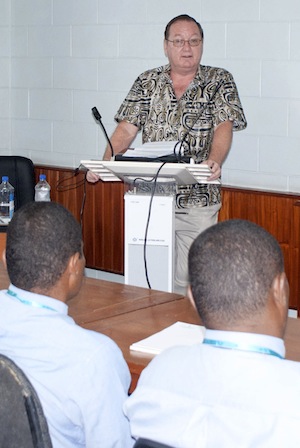
TUESDAY 25 SEPTEMBER 2012 - ‘It really is very simple. The workshop is about improving the safety of life at sea.’
Dr Russell Howorth of the Secretariat of the Pacific Community (SPC) made this comment in his opening address of the Hydrographic Surveying and Nautical Charting Workshop, taking place at Fiji’s Naval Headquarters from 24 September to 5 October.
Dr Howorth, Director of SPC Applied Geoscience and Technology Division, said that the aim of the workshop, funded by the International Maritime Organization (IMO) and organised by SPC, is to assist the participating countries to meet the basic requirements of navigation and safety as required and regulated by IMO’s International Convention for the Safety of Life at Sea.
‘We must support campaigns to raise awareness of the safety and economic importance of hydrographic surveying and nautical charting services in the region,’ said Dr Howorth.
Hydrographic surveys refer to mapping the seabed, while nautical charts show maritime areas and include features of the seabed, navigational hazards and other details; charts being to ships what roadmaps are to cars.
Dr Howorth explained that many of the charts in use today are old and inadequate for modern navigational tools and standards.
‘It is imperative that this inadequacy be addressed, if larger vessels, demanding stricter safety standards, are to service our region. Without these vessels, which are vital for trade and, increasingly, cruise tourism, development of the island economies of our region is at risk,’ said Dr Howorth.
The workshop, conducted by trainers from the United Kingdom Hydrographic Office, is a regional initiative for Asian and Pacific nations; participants are from Sri Lanka, Myanmar (Burma), Cook Islands, Federated States of Micronesia, Fiji, Kiribati, Samoa, Solomon Islands, Tonga, Tuvalu and Vanuatu.
Dr Howarth said that the workshop would contribute to building capacity in hydrographic surveying and nautical chart production in the participating countries. The aim is for national maritime authorities to provide the necessary high quality products and services that fulfil the requirements of the International Convention for the Safety of Life at Sea.
‘The only way to manage and reduce the risks at sea is to be compliant with international standards. This workshop is an important contributing activity to managing these risks in the countries represented here today,’ he said.
The workshop will cover a wide variety of subjects, both in theory and in practice, supported by the facilities of the Fiji Hydrographic Survey office on shore and the ship, FNS Lautoka, for surveying activities at sea.
For further information, please contact: Dr Russell Howorth. Email: This e-mail address is being protected from spambots. You need JavaScript enabled to view it Tel: + 679 3381377

Photo captions:
Dr Russell Howorth addressing participants in the Hydrographic Surveying and Nautical Charting Workshop.
Robert Smith, SPC’s Senior Advisor, Marine Geophysics, (left) and Dr Russell Howorth. Mr Smith was responsible for organising the workshop.





